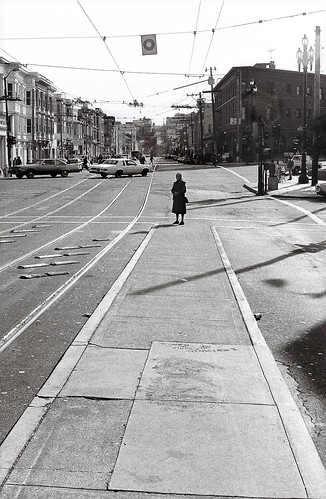
Even telegraph poles look foreign: tarry, scuffed
and twice as thick,
stapled with colourful fliers: travel ads, want ads,
apartments, missing pets, people –
When torn off to make way for new ones (torn in their turn),
the tiny corners remain,
a mesh of staked claims, stitches, a wound
that won’t close. I zoom and click,
wondering what my roommates will make of
the furious mosaic.
One thinks it’s a shanty town, another a beach
or city dump, or maybe a march
or sit-in, people holding up placards, right?
Close enough.

3 comments:
Hello Mark.
I hope it's OK to ask a technical question, about yr choice of a punctuation mark, the dash at the end of the second (or fourth) line, after which you capitalize the next word, 'When'.
I am wondering how consciously you decided to do this (I am guessing fully so?) and, if possible, I would be delighted to hear the reasoning behind it, please.
I don't know the protocol and precendents with this particular puncuation mark, and would love to hear from one far more experienced than myself, their thinking on it.
Sincerely
Desmond
Dear Desmond,
Not sure if you're pulling my leg ('far more experienced', 'delighted to hear the reasoning', 'protocol and precedents'), but your guess is right, it was 'fully conscious'. An ellipsis would have been more 'correct', since it would suggest those other types of poster/flier I didn't want to bother describing. But an ellipsis can look sentimental, like a smear of vaseline on the lens. I wanted something more abrupt, less like an ellipsis and more like a staple.
As Wiki puts it: 'The em [i.e. longer] dash is used in much the way a colon or a set of parentheses is used; it can show an abrupt change in thought or be used where a full stop (or "period") is too strong and a comma too weak.'
Anyway, it's all here: http://en.wikipedia.org/wiki/Dash
Happy reading.
Thanks very much Mark.
I know I can and do sound like I am taking the mick much of the time, but the reason for the over-politeness, is coz when re-reading correspondence from years ago (and in general) I often sound brusque, arrogant and a bit uppity. Plus the asking of this question coincides with a time in my personal-public life as a blogging bluffer, where I am acting a bit off the rails in certain long standing e-relationships with some online pple I've never met, and have started saying negative stuff that could be either bang on from the hidden depths, or the ranting of a deluded misanthrope.
Seeing this sparked off a sincere wonder and I suppose I was so pleased it had happened, a genuine wanting to know, coinciding with ranting in a horrid tenor elsewhere today, that I shifted into the nicey nice honest mode to make up for the nasty brawling guff I'd indulged in earlier today with some online colleagues.
You are far more experienced, I've only been at it ten years, whilst you've been dabbling well before I ever picked up the pen, and protocol and precedents, I could've spent time with the thesuarus pin pointing more exact words, but it was spontaneous questioning.
Anyway, enough of that; thanks very much for the low-down. My own understanding on this came on reading Pliny Younger's letters. Up till then, free-writing all the time, going on instinct and trusting I'd end up somewhere rather than thinking of a destination, my thoughts were racing ahead of the capacity to contain them, and it took about 10,000 hours practise to grasp the basics, bone-knowing would describe it, horse-nous, as Mulhaney mate gab, which came fully delivered on reading Pliny Younger's letters, after picking them up from Murragh's magic bookstall in Temple Bar at the weekends.
80% of my entire few hundred book library came from Murrragh, acquired over four years, each week there were more books than was possible top buy, from 1950's Irish texts socity publications by Eleanor Knot and Gerard Murphy, all the bardic stuff you'd never find in London, to the Greek and Roman classics, among which I picked up Pliny.
It was only reading him, that I came to see with my own eyes, what the fuss about Latin being the perfect language for laying out thoughts, was all about. Up till then, it was like being instructed how to build a bricxk wall through a totally verbal medium, no tools, pictures or pratical applications, just someone saying, and then there's a thing called bricks and a trowel that's this shape and you blah blah blah; but reading Pliny, it fell into place all of a sudden. The four (or five and six) beat system of wrapping up the mental stream that starts ineffeably within and makes it out thru the hands onto a page. A comma is quarter beat, semi-colon a half; a colon (as Szirtes has it) is the pause before a 'minature drum roll': something important following, whilst the period signals the end - dashes being - as you say - either or; a thought that only occured after the four beat basic system came with Pliny's Letters.
Anyway, thanks very much. Am off to Wicklow on Saturday, reading at the Gateway festival, a new one, wityh Cormac Daly from Kerry, tall, bald, total spacer, the only one of eight poets doing the Tara Awareness gig in Major Toms a few years back, who wrote a poem specially for the night, ending on
One day the stones too will have their say.
Thanks very much
'suboders' is wordver
Post a Comment